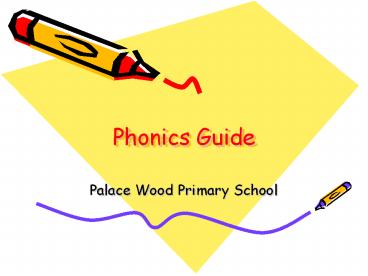Phonics Guide - PowerPoint PPT Presentation
1 / 32
Title: Phonics Guide
1
Phonics Guide
- Palace Wood Primary School
2
Read this to your partner.
- I pug h fintle bim litchen.
- Wigh ar wea dueing thiss?
- Ie feall sstewppide!
3
Some definitions
- A phoneme is the smallest unit of
- sound in a word.
- C-u-p c-a-t d-o-g
4
Count the phonemes
- How many phonemes can you count in the following
words? - Mask
- Car
- Jumper
- Language
- Communication
- Success
5
Some definitions
- Grapheme
- Letter(s) representing a phoneme
- t ai igh
6
Some definitions
- Blending
- Recognising the letter sounds
- in a written word, for example
- c-u-p, and merging or synthesising
- them in the order in which they
- are written to pronounce the
- word cup.
7
Some definitions
- Oral blending
- Hearing a series of spoken sounds and merging
them together to make a spoken word no text is
used. - For example, when a teacher calls out
- b-u-s, the children say bus.
- This skill is usually taught before blending and
reading printed words.
8
Some definitions
- Segmenting
- Identifying the individual sounds in a spoken
word - (e.g. h-i-m) and writing down or manipulating
letters for each sound to form the word him.
9
Some definitions
- Digraph
- Two letters, which make one sound
- A consonant digraph contains two consonants
- sh ck th ll
- A vowel digraph contains at least one vowel
- ai ee ar oy
10
Some definitions
- Trigraph
- Three letters, which make one sound
- igh dge
11
Some definitions
- Split digraph
- A digraph in which the two letters are not
adjacent (e.g. make).
12
CVC Words
- C consonant phoneme
- V vowel phoneme
- C consonant phoneme
13
Words sometimes wrongly identified as CVC
- bow
- few
- saw
- her
- Why are these words not CVC words? Discuss.
14
Consonant digraphs
- ll ss ff zz
- hill puff fizz
- sh ch th wh
- ship chat thin
- ck ng qu x
- fox sing quick
15
CVC words clarifying some misunderstandings
p i g s h e e p s h i p c a
r b o y c o w f i l l w h i p s o n
g f o r d a y m i s s w h i z
z h u f f
16
CVC words clarifying some misunderstandings
- p i g c h i c k
- s h i p c a r X
- b o y X c o w X
- f i l l w h i p
- s o n g f o r X
- d a y X m i s s
- w h i z z huff
17
ll ss ff zz ck
- fill miss whizz huff
- chick
- Why do these words end in double letters?
18
Examples of CCVC, CVCC, CCCVC and CCVCC
- b l a c k s t r o ng
- c c v c c c c v c
- f e l t b l a n k
- c v c c c c v c c
19
A segmenting activity
20
A segmenting activity
s
s
21
A segmenting activity
s
l
l
s
22
A segmenting activity
s
i
l
i
l
s
23
A segmenting activity
s
p
i
l
p
i
l
s
24
A segmenting activity
- Segment these words into their constituent
phonemes - shelf
- dress
- think
- string
- sprint
- flick
25
Segmenting
WORD PHONEMES PHONEMES PHONEMES PHONEMES PHONEMES PHONEMES
shelf
dress
think
string
sprint
flick
26
Segmenting
WORD PHONEMES PHONEMES PHONEMES PHONEMES PHONEMES PHONEMES
shelf sh e l f
dress d r e ss
think th i n k
string s t r i ng
sprint s p r i n t
flick f l i ck
27
A basic principle
- The same phoneme can be represented in more than
one way
burn first term heard work
28
A basic principle
- meat bread
- he bed
- bear hear
- cow low
29
The same phoneme can be represented in more than
one way
- a a-e ai ay ey eigh
- e e-e ea ee y
- i i-e ie igh y
- o o-e oa oe ow
- u u-e ue oo ew
- oo u oul
- ow ou ough
- oi oy
- ar a
- or aw ore a ough
- air are ear
- eer ear
30
High frequency words
- The majority of high frequency words are
phonically regular. - Some exceptions for example the and was
should be directly taught.
31
More Ideas
32
(No Transcript)































